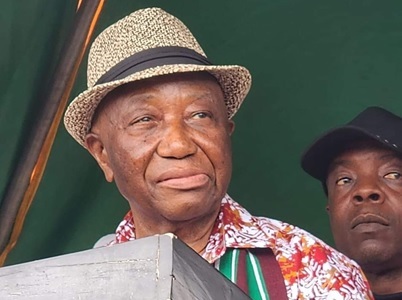A Commentary By Wondah L. Jah
In January, Joseph Boakai, an 80-year-old veteran politician, assumed the presidency of Liberia, succeeding former soccer star George Weah in a closely contested election. Boakai’s victory, achieved with a margin of around 20,000 votes, was marked by Weah’s unexpected concession before the official announcement of results. Campaigning under the banner of a “rescue train,” Boakai managed to rally support, even among some members of Weah’s own party, the CDC, who expressed their dissent through their votes.
However, the optimism surrounding Boakai’s inauguration quickly faded. On the very day he took office, allegations of corruption emerged, with reports of over $350,000 earmarked for programs being misappropriated. This prompted the establishment of a committee to investigate the scandal, casting a shadow over Boakai’s initial days in office. Adding to the embarrassment, Boakai suffered a fall during his inaugural speech, a moment that symbolized the shaky start to his presidency.
Immediately after assuming power, Boakai’s administration moved swiftly to dismiss hundreds of civil servants previously employed under Weah’s regime, justifying these actions by claiming they were not on the official payroll. This aggressive approach extended to the removal of dozens of presidential guards, as well as officials holding tenure positions, despite a high court order to the contrary. Recently, Boakai suspended the Governor of the Central Bank and is reportedly planning to oust all his deputies, actions that appear to be less about governance reform and more about targeting Weah’s appointees.
In a dramatic escalation, Boakai has begun arresting senior officials from Weah’s government, including former finance and justice ministers, using audit reports as a basis for these actions. This has led to an increasingly tense political climate, with Weah himself threatening to act against what he perceives as Boakai’s attempts to undermine his party.
Liberia, a nation still healing from past conflicts, faces the risk of renewed violence and instability in this charged political atmosphere. The close nature of the election has deepened societal divisions, raising concerns among political experts who argue that Boakai has not effectively leveraged his extensive experience to balance anti-corruption efforts with the need for security and stability in a country with weak institutions.
Moreover, Boakai’s administration seems to overlook the importance of public perception. The new president must recognize the potential consequences of immediate arrests on public trust and confidence. It is crucial to communicate the rationale and objectives behind anti-corruption initiatives clearly, ensuring that the public understands the fairness and impartiality of these processes.
Reconciliation and national unity should be prioritized in the post-election period. While addressing corruption is vital, it must be approached in a manner that does not exacerbate societal polarization. Boakai’s government should strive to foster an environment where dialogue and collaboration can replace hostility and division.
In conclusion, while tackling corruption is undeniably important, President Boakai must weigh the timing, due process, institutional capacity, public sentiment, and the imperative for reconciliation before initiating widespread arrests of former officials. A balanced and strategic approach is essential to ensure the effectiveness and legitimacy of anti-corruption efforts. The selective targeting of Weah’s officials, particularly when other audit reports implicate the first Unity Party under Ellen Johnson Sirleaf and at the time Boakai himself was vice president risks plunging the nation into chaos.
Weah could exploit this atmosphere of discontent if he mobilizes his supporters for public protests, especially during a time when Boakai’s government struggles to pay salaries to public servants. The next steps taken by Boakai will be pivotal in determining the future stability of Liberia and whether he can truly listen to the protests echoing from Kenya and Nigeria and beyond.








